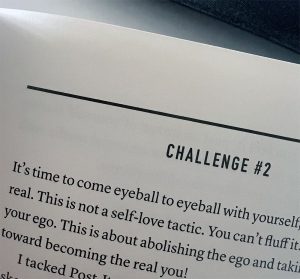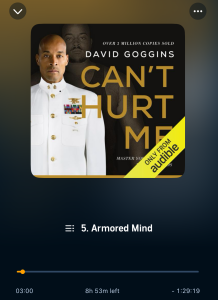Can’t Hurt Me is a strange book to review. It’s an autobiography and a self-help book, all in one. As such, any Review of it will need to cover all aspects, and that is not a simple task, as I am not a self-help expert and cannot be sure whether the Author is offering sound advice. The best I can do is offer my opinion.
What is it about?
David Goggins is a Former Navy SEAL, Army Ranger and Air Force Controller. He is also an ultramarathoner and a former Guinness World Record Holder for the Pull-up. He went through Navy SEAL Hell Week twice and completed SEAL Training despite running on broken legs.
Can’t Hurt Me is his autobiography. It is an inspiring story (even if he says “motivation is crap”) of a young man with a very problematic childhood, with him and his mother being mentally, verbally, and physically abused by his father, who went from being a bug exterminator weighing 140 kg to a Navy SEAL and one of the fittest people on the planet.
This book is primarily a story about how he did it, but it is also offered as a self-help book, as an example of how, despite our upbringing and the cards we were dealt, we can all reach our potential and get what we want. He offers his techniques for how he did it, advice on how we should improve ourselves, and “challenges” we should complete after each Chapter.
Summary
Goggins, strictly speaking, does not come from Poverty in the traditional sense, as he was born to a wealthy family. However, he, his mom, and his brother didn’t experience much of that wealth. They primarily experienced abuse, which led to their mother abandoning her abusive husband and taking David with her. This made him experience Poverty, and as a teenager, he didn’t do well in school and was almost unable to read.
During his twenties, he found comfort in food, which led to his becoming overweight. He was at that time employed as a bug exterminator.
After seeing a documentary about Navy SEALs, he turned his life around, lost 45 kg in 3 months to meet the weight limit in time, and joined SEAL training. After that, he kept pushing himself and achieving many physical feats, including becoming a SEAL, being an ultra-marathoner and breaking the Guinness World Record for pull-ups.

Key Lessons
Note that I do not like or recommend those 15-minute book summaries, as you often get things out of context, which ultimately makes them way less powerful. Here, I feel it would be helpful to you to get a rough preview of the lessons you can potentially expect.
Obstacles are opportunities
I think this is the main point the book wishes to make: no matter what the problem is or what obstacle stands in our way, it is just an opportunity for us to push through and reach our full potential, as we are the heads of our own destinies. No matter what cards we were dealt, it is up to us to own them.
The Accountability Mirror
Goggins wrote post-its about his flaws and stuck them on a mirror. He challenges us to take an inventory of our flaws and dreams and put them in our mirrors to hold ourselves accountable.
The Cookie Jar
We need to keep track of our accomplishments to know what we have achieved so far and to get back to these moments to remind ourselves that we have already gone through worse.
Taking Souls
Taking Souls is his way of being your best—you should exceed all expectations of people; for example, if you get assigned to Author a paper, you should not only Author that paper but also others you didn’t even get assigned. This is not meant in a mean way, to spite others, but rather to win a mental game with yourself.
The Governor & The 40% Rule
These principles tell us that when our brains say we are tired, there’s a lot left in our tanks—Goggins estimates about 60%. If we push through, we can beat our limiting beliefs.
Review
I am conflicted. This is, no doubt, an incredible story. The first part was fantastic, about where he grew up and what he had to endure, right up to the point where he ended up in the SEALS. It is an inspirational story about what he achieved—and what can be achieved if you persist and push yourself towards your goals.
I feel that from this first part, one can indeed learn a lot, as the story itself is refreshing—there are no lucky breaks; it is mostly grit and determination when going after your goals. And the lesson is that no matter what cards you are dealt, they are now your cards, your responsibility.
However, there is a second part about what happened after he became a SEAL and took on other physical feats, like becoming an ultramarathoner. I feel that his motivation for doing this and the way he did it are not the healthiest. First, as he says and admits, he was unnecessarily harsh on fellow SEALs who did not wish to live the same way he did—constantly pushing, or should I say, punishing themselves. And he didn’t get to Green Team. This, in fact, proves to me that there are other and better ways of being successful, even in the SEALs.
While there are a lot of good lessons and techniques about the mind games you play with yourself, I think challenging yourself constantly out of personal pride is not the healthiest, especially given how many times he showed up completely unprepared for what was to come. That is not only stupid, but it will also potentially get you killed- If you attempt to say, run 50 miles completely unprepared and try to “push through” you could end up dead or with an injury.
He explicitly says that what he did is not highly intelligent and that it is not what you should do. He also says that you need to do it gradually instead. However, I can imagine there will be people who will think “Goggins did it, so can I”. Of course, that is not his fault. What I wish to say is – you need to turn on your brain and really accept only those principles that are right for you.
As I said, I am conflicted. On one hand, it’s a fantastic biography, full of inspiring advice and amazing techniques. On the other hand, there is some advice on how not to live, especially when there’s so much content about pushing yourself and so little about nurturing yourself. Again, I am not a doctor or any self-help expert, but I do think that we need both to push ourselves and encourage ourselves to lead our best lives.

Audiobook
Even with everything I wrote in the last few paragraphs, I do find the book remarkable and refreshing enough that I own an audiobook on Audible as well. I often listen to it to refresh some concepts.
The audiobook is fascinating, as after every Chapter there is a segment in which the reader interviews Goggins. I found this fun at the beginning, especially with Goggins explaining the challenges to the listener in a bit more depth.
However, after the first few of those segments, you start to feel they are pretty long and often unnecessary, as the interview questions seem explicitly designed to build up Goggins and make him feel better about himself, rather than the interviewer using the opportunity to challenge the concept.
Overall, the audiobook is different enough to deserve a special mention here; unfortunately, the added segments should have been shorter and more useful, as they often repeat what has just been said.
